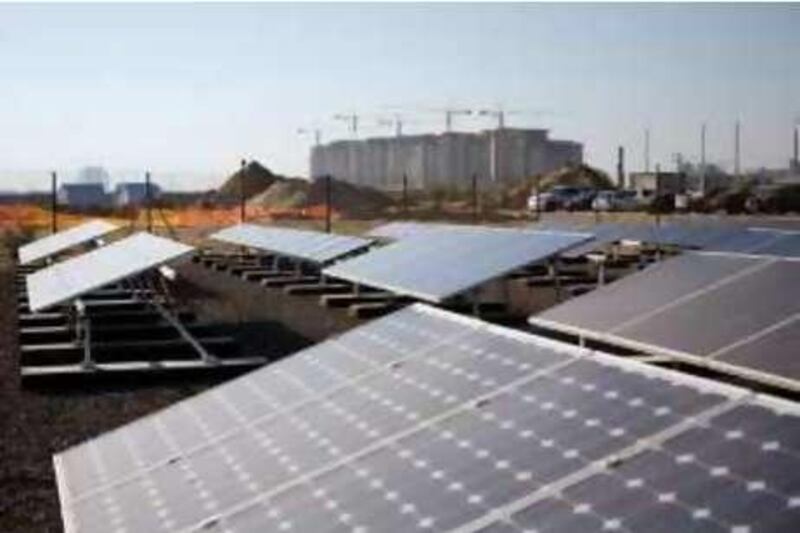Rapid advances in solar panel technology could make it competitive with more conventional forms of producing energy in the UAE in as little as two years, a Swiss alternative energy financier has said. Long hours of intense sunshine make the Gulf an ideal place for such technology, while a forecast 48 per cent annual growth in the global market for photovoltaic systems over the next few years is expected lower the cost of solar cells.
"We foresee an annual average cost reduction of 10 per cent as achievable, ie; grid parity, in the UAE in two to three years' time," said Matthias Fawer, the vice president for sustainable investment at Sarasin Bank in Switzerland. "You have most favourable solar conditions that will make the Middle East one of the first key markets where solar becomes the cost-competitive choice pretty soon." The high cost of silicon-based photovoltaic cells worldwide is still the main impediment to making solar power competitive, but costs are falling as production rises.
Abu Dhabi is currently building a plant with an annual production of cells capable of generating 10 megawatts and plans to build another, 100 megawatt solar thermal plant, in Madinat Zayed. The cells from this plant are destined for power generation in other countries, but Masdar, the Abu Dhabi Future Energy Company, is looking to solar energy for 80 per cent of the power needs of a new carbon-free city in the capital.
One factor slowing the development of solar power in the UAE is the low cost of conventional power. The Government subsidises electricity prices through very low prices for natural gas. In Germany and some other European countries, governments have introduced big incentives for solar power producers, promising to pay them more for every kilowatt they produce. In a report this week Sarasin Bank painted a rosy picture for the future of solar power, predicting that commercial-scale systems would be widely implemented within four years.
The credit crunch means solar projects may be "resized, but not scrapped" in the next year, he added. The bank forecast solar generating capacity would rise from four gigawatts today to 125 gigawatts by 2020, led by advances in photovoltaic solar panels. A large conventional coal or nuclear power station typically generates between one and two gigawatts. Solar power projects are generally much smaller, with very low maintenance costs.
One major drawback of solar is that it cannot produce a steady flow of electricity over a 24-hour cycle and therefore requires either alternative power or power stored in batteries to continue providing current during the night. Sarasin focused on the prospects for growth in GCC countries and Abu Dhabi in particular. Masdar is financing several major solar projects, including the Madinat Zayed plant.
In some rural parts of the northern Emirates, where diesel is regularly used to produce electricity, solar panels may already be competitive, according to Robert Bryniak, the chief executive of Golden Sands Management Consulting, which has studied the UAE power market. "It's not competitive if your option's gas right now," he said. "However, if you're in the northern Emirates and you're using diesel, it could be competitive."
Eckart Woertz, an economist at Gulf Research Centre in Dubai, cautioned that cross-calculations between solar power and other energy sources could be misleading because they often left out factors such as the cost of power transmission, which is less for solar panels located closer to the end-user. Dr Woertz said all renewables, including solar energy, had become less competitive as prices for oil and natural gas had fallen.
"Renewable energies are rather at a disadvantage compared to, say, three months ago," he said. "But the strategic rationale for renewables remains intact as they are the only viable long-term alternative to fossil fuels." cstanton@thenational.ae





